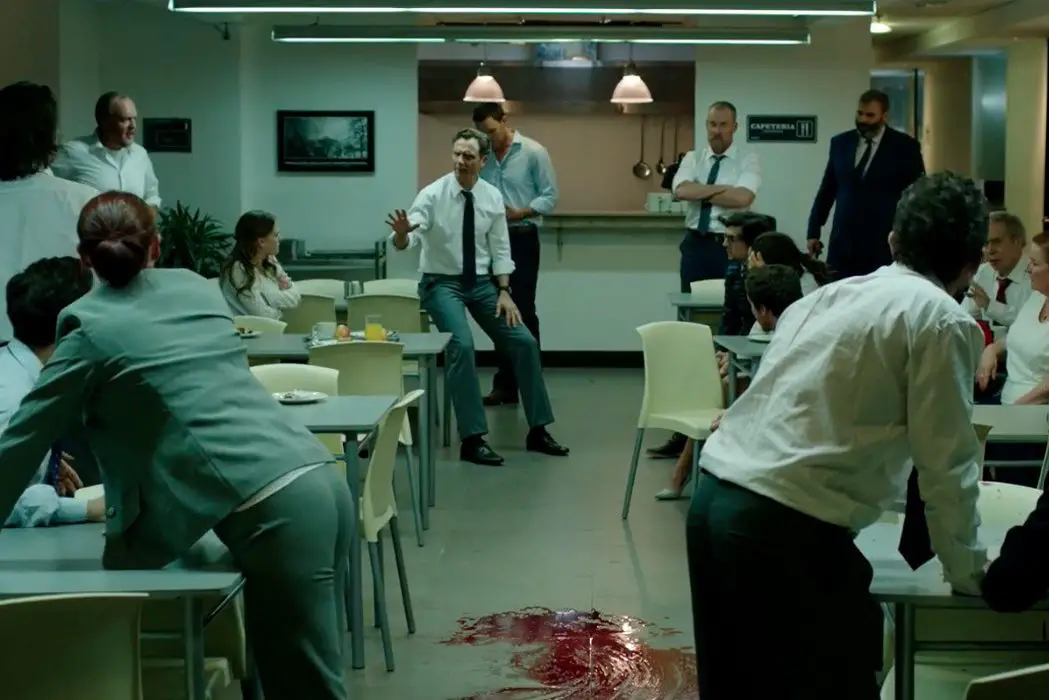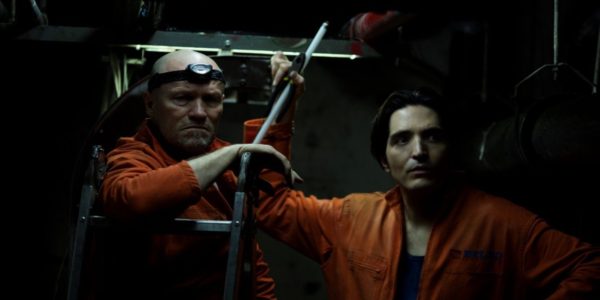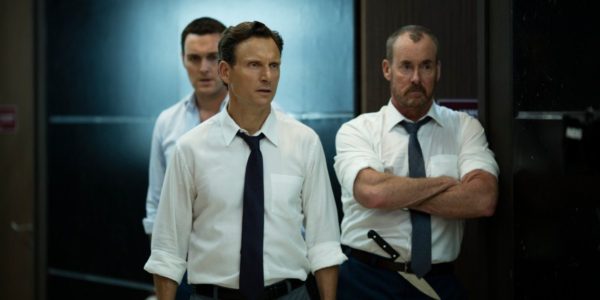THE BELKO EXPERIMENT: A Lack Of Experimentation Makes For A Forgettable, Shallow Movie

OK, maybe that’s a little harsh. But there’s really nothing special about The Belko Experiment; what you see is what you get. Not that there’s anything wrong with that – it’s just frustrating when a little bit of extra thought and effort could have turned this movie into the socially conscious, thought-provoking, subversive film that it aspires to be.
What did The Belko Experiment do right?
Maybe my expectations were unfairly low due to the generally negative reviews, but I came away pleasantly surprised with a few aspects of the movie.
The first five minutes of The Belko Experiment hints at decent cinematography with an almost artsy credits reveal – and the rest of the movie actually delivers on several occasions. There are many legitimately well-framed, visually appealing scenes that were clearly inspired by a wide range of cinema, ranging from Kingsman to 2001. Both lighting and music are used effectively, giving the movie a fairly striking style (and if nothing else, the soundtrack gives us some great Spanish covers of classic 60’s and 70’s tunes).

To its credit, The Belko Experiment doesn’t mess around: it gets to the “experiment” part of the movie pretty quickly, thanks to a few minutes of clumsy expository dialogue. But guess what: I didn’t go see The Belko Experiment for a master class in subtlety or effective exposition. I went for the experiment. Too many of these types of movies take themselves way too seriously and dawdle around for 45 minutes before getting to the action. But when you’re going to be a straight-up action movie, you might as well get to the action as soon as possible.
Similarly, once The Belko Experiment had established that there wasn’t going to be much higher meaning or allegorical symbolism (more on this later), the writers at least fully committed to the bit. The last act removes any arbitrary rules or numbers from the experiment, just letting the characters go at it video-game deathmatch style. This part is the most enjoyable sequence of the movie because we’re finally done mucking around with meaningless, shallow moral debates, so we can sit back and watch poorly-developed characters murder each other with office supplies.
Finally, The Belko Experiment is definitely an “audience movie,” where a crowd full of both cynics and hardcore genre fans alike make for a far more enjoyable movie experience. It succeeds on this front, pulling no punches with the gratuitous violence that certainly does its job in eliciting a reaction from the audience. Moreover, while the comic relief does seem a little forced in a few scenes, it lightens the tone enough to keep us laughing and engaged.
What did The Belko Experiment do wrong?
I’ll cut straight to it: The Belko Experience is pretty forgettable, which is probably the second worst thing a movie can be (behind being boring and ahead of being directed by Zack Snyder). Once it reveals its premise, you think so I guess pretty much everyone is going to kill each other or get their head exploded and then (spoiler) that’s basically what happens. There’s not much along the way that changes the plot or even makes the viewer rethink things – in other words, there’s just not much to remember about the movie.

The Belko Experiment is ultimately doomed by its characters’ frustratingly feeble attempts at outsmarting the “experiment” before devolving into a murderous mania. A more interesting movie would have matched resourceful office workers against the experimenters in a battle of wits. Look at Battle Royale, which is essentially a much better version of The Belko Experiment.
It takes a suspiciously similar premise and builds on it with intelligent, nuanced protagonists and antagonists, evolving into an unpredictable, thought-provoking story. As a result, we actually care about several characters – making its gratuitous violence that much more affecting. That’s why Battle Royale is a memorable cult classic while The Belko Experiment’s unremarkable characters make it an unremarkable movie.
On top of nondescript characters, The Belko Experiment offers nothing new or unique with its setting; the office environment barely influences the plot at all. We’ve seen a lot of similar movies where our main characters are pitted against each other in confined spaces, but not many that take place in an office building. This should have been a great opportunity for some brutal copy machine or stapler kills – but the writers refused to explore anything new, instead giving the characters guns almost immediately. This is just lazy writing, plain and simple.

It’s almost like the writers started out too ambitiously then totally mailed it in for the last three-quarters of the movie. The Belko Experiment promises some sort of social commentary at the beginning, placing a safe haven of only white people (they literally go out of their way to establish this as a plot point) in the middle of a poor Colombian suburb. But the movie doesn’t even attempt to go anywhere with this.
None of the characters are fleshed out enough to make a statement on human nature, much less a more nuanced statement on class or race. It’s more than a little unfortunate for The Belko Experiment that it was released so closely to Get Out, a movie whose perfect balance of horror-based tension and social commentary glaringly illuminates The Belko Experiment’s flaws.
Conclusion
The Belko Experiment wasn’t necessarily bad – it actually turned in a few fairly entertaining scenes. But it did next to nothing to set itself apart, putting unremarkable characters in a mundane setting to play out a plot we’ve seen several times before. This was only so disappointing because just a little bit more creativity and effort could have made the story far more meaningful and remarkable. Instead, we’re left with a mildly enjoyable movie that we’ll forget ten minutes after walking out of the theater.
That’s enough from me – what did you think of The Belko Experiment? Were you more or less impressed than I was? Can you recall any of the characters’ names without referring to them as Bighead, Dr. Cox, or Merle? Let us know in the comments!
The Belko Experiment premiered at the Toronto International Film Festival in September of 2016, and was released in the US on March 17, 2017. It will be released in the UK on April 21, 2017. For a list of all release dates, see here.
Does content like this matter to you?
Become a Member and support film journalism. Unlock access to all of Film Inquiry`s great articles. Join a community of like-minded readers who are passionate about cinema - get access to our private members Network, give back to independent filmmakers, and more.













